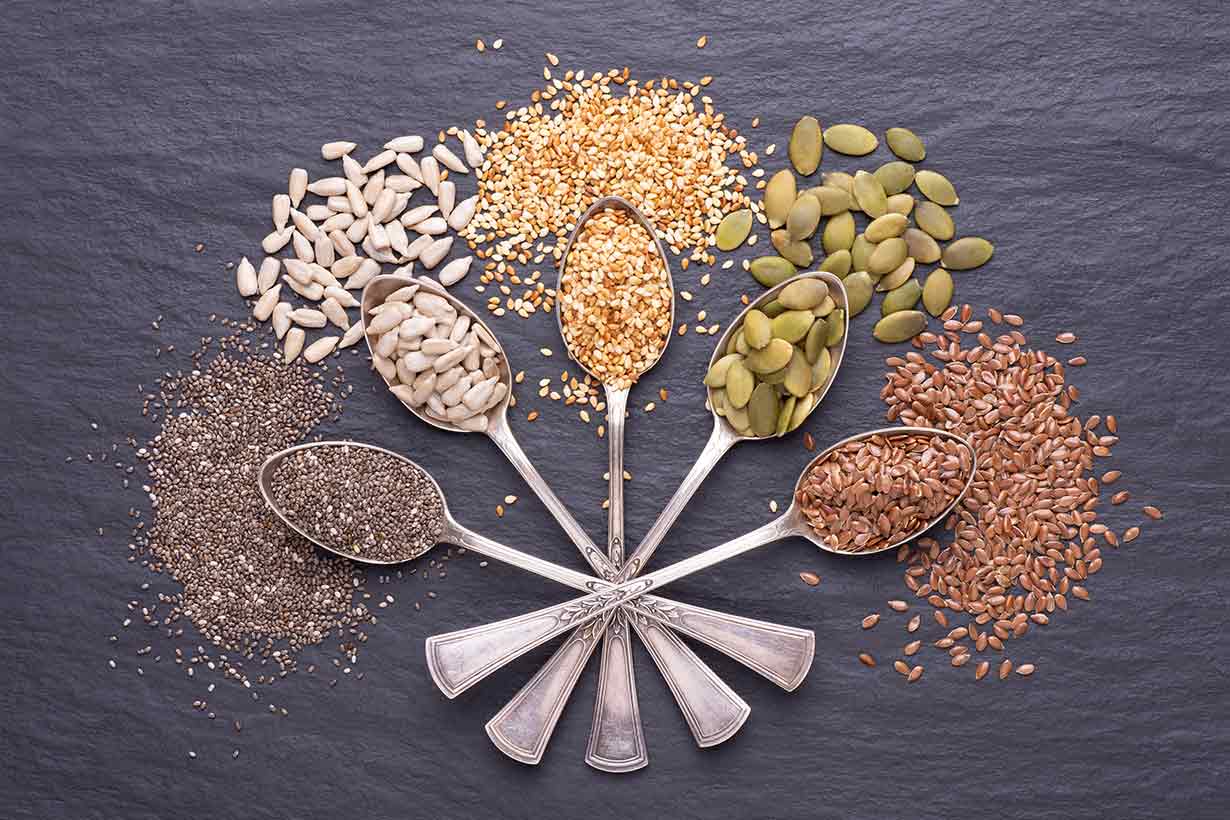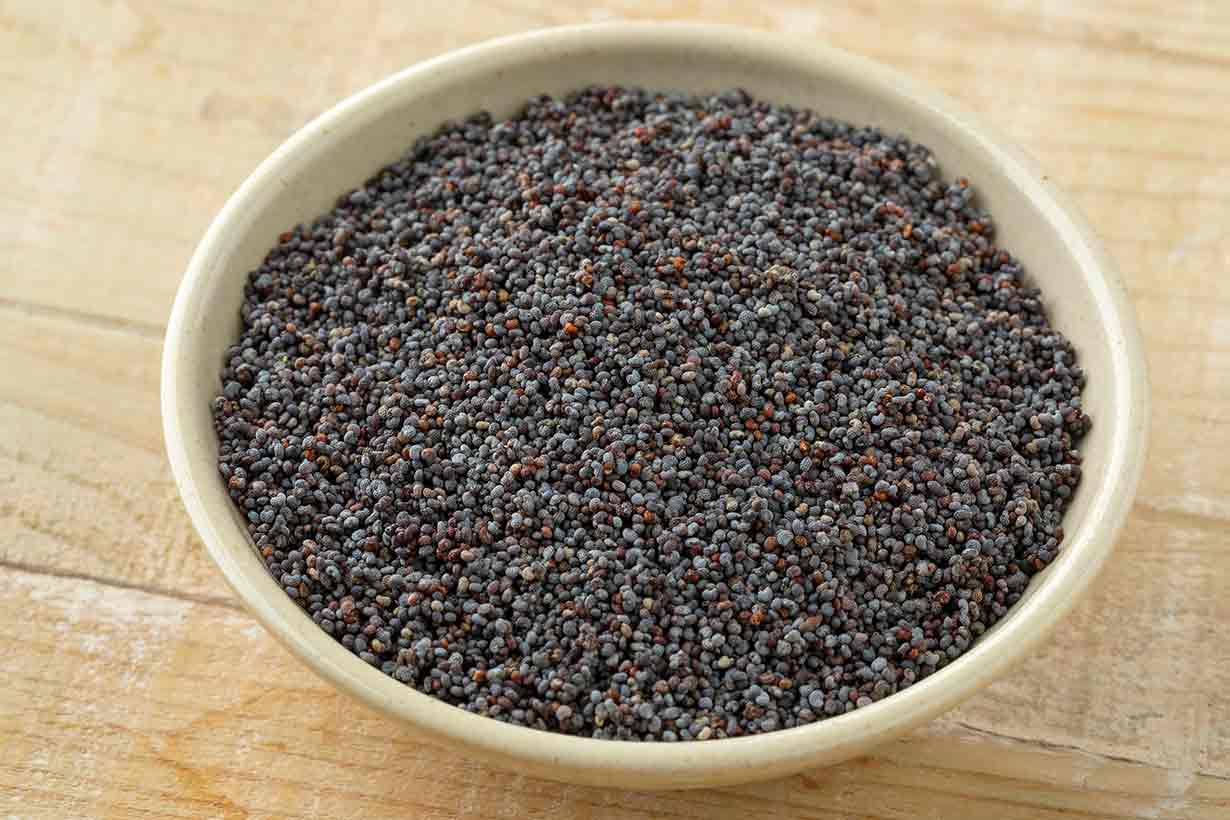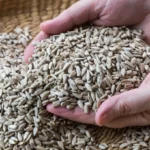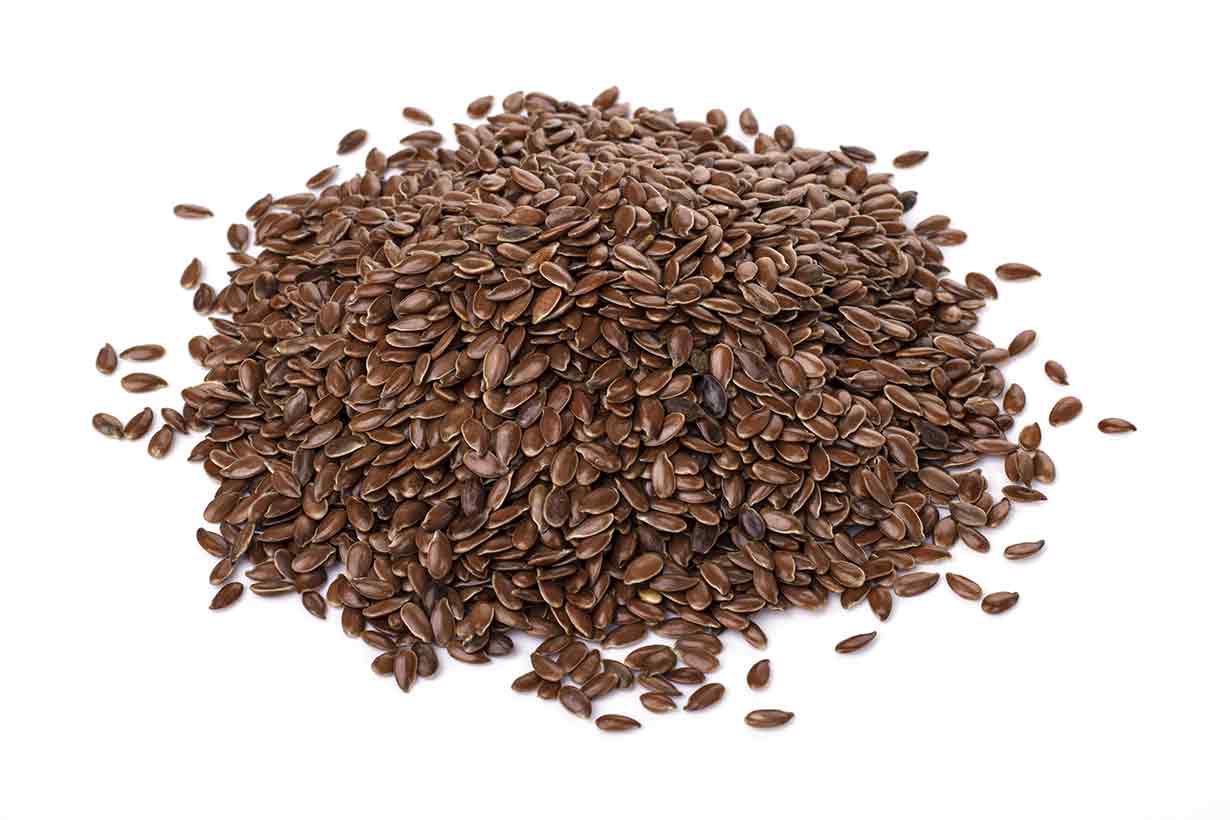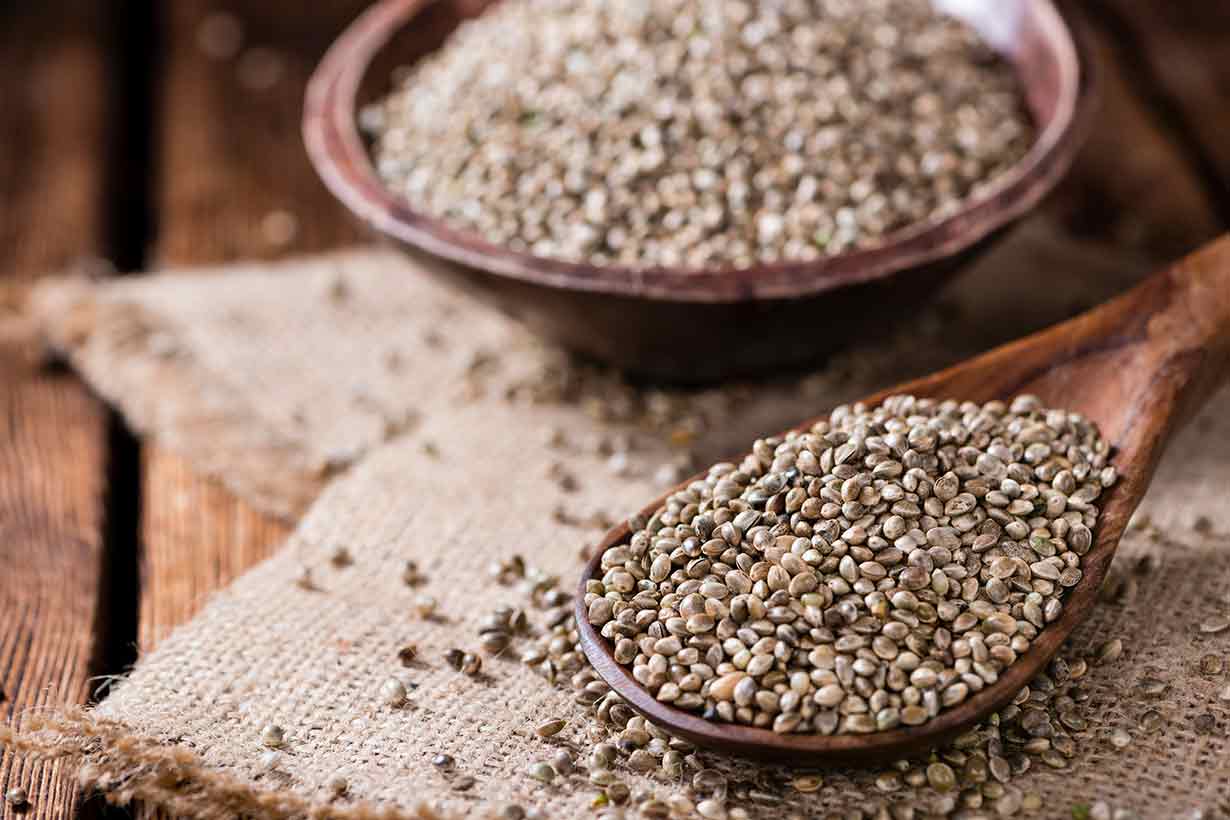Not only do sesame seeds impart a delicious flavor to food, but they also provide a broad range of essential nutrients.
Furthermore, recent scientific research suggests they may offer some interesting health benefits.
This article examines the nutritional profile and potential benefits of sesame seeds.
Table of contents
The Nutritional Profile of Sesame Seeds
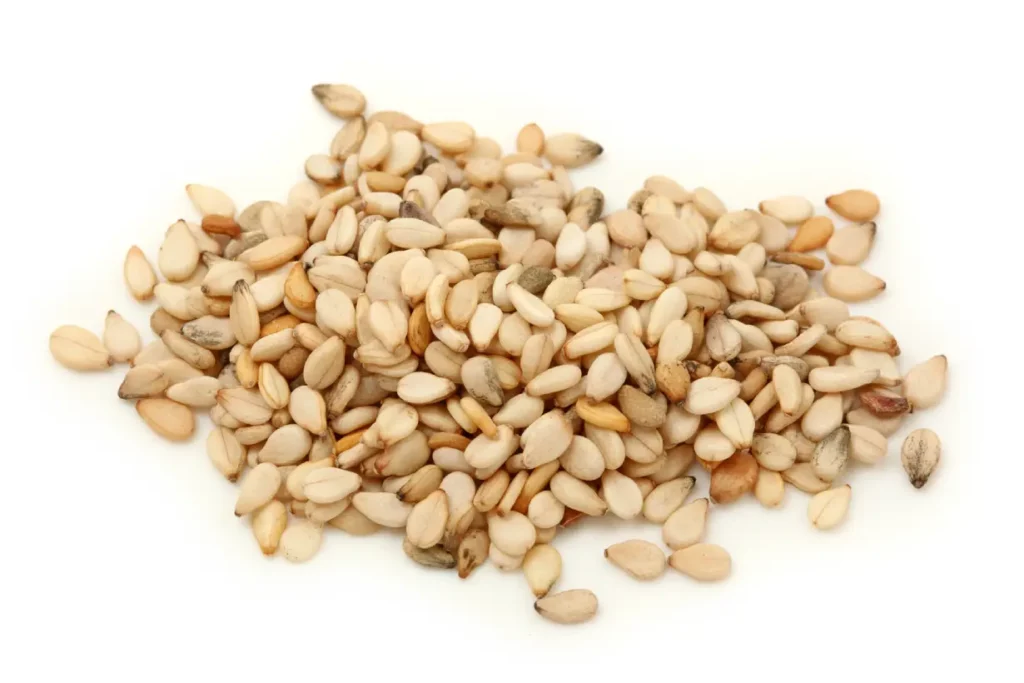
Before we explore the benefits of these small seeds, let’s first take a look at the nutrients they provide.
The following tables present the complete nutritional values of sesame seeds per ounce (28.35g) serving, with data sourced from the USDA’s FoodData Central (1).
Calories and Macronutrients
| Nutrient | Amount | % Daily Value |
|---|---|---|
| Calories | 177 kcal | |
| Carbohydrates | 3.28 g | 1% |
| Fiber | 3.25 g | 12% |
| Sugars | 0.13 g | |
| Fat | 17.1 g | 22% |
| Saturated fat | 2.54 g | 13% |
| Monounsaturated fat | 6.7 g | |
| Polyunsaturated fat | 7.14 g | |
| Omega-3 | 0.07 g | |
| Omega-6 | 7.06 g | |
| Protein | 5.73 g | 11% |
| Cholesterol | 0 mg | 0% |
As the table indicates, sesame seeds are a good source of unsaturated fatty acids and also provide fiber and protein.
This macronutrient profile is comparable to other seeds, such as pumpkin seeds and sunflower seeds.
Vitamins
| Vitamin | Amount | % Daily Value |
|---|---|---|
| Choline | 7.17 mg | 1% |
| Folate, DFE | 32.3 mcg | 8% |
| Thiamin (B1) | 0.20 mg | 17% |
| Riboflavin (B2) | 0.03 mg | 2% |
| Niacin (B3) | 1.62 mg | 10% |
| Vitamin B6 | 0.11 mg | 6% |
| Vitamin B12 | 0 mcg | 0% |
| Vitamin A, RAE | 0.84 mcg | <1% |
| Vitamin C | 0 mg | 0% |
| Vitamin D | 0 mcg | 0% |
| Vitamin E | 0.47 mg | 3% |
| Vitamin K | 0 mcg | 0% |
Sesame seeds contain moderate amount of folate, thiamin, and niacin.
Minerals
| Mineral | Amount | % Daily Value |
|---|---|---|
| Calcium | 16.8 mg | 1% |
| Copper | 0.39 mg | 43% |
| Iron | 1.78 mg | 10% |
| Magnesium | 96.6 mg | 23% |
| Phosphorus | 187 mg | 15% |
| Potassium | 104 mg | 2% |
| Selenium | 9.63 mcg | 18% |
| Sodium | 13.2 mg | 1% |
| Zinc | 1.88 mg | 17% |
Sesame seeds are particularly rich in copper and magnesium and offer moderate amounts of iron, phosphorus, selenium, and zinc.
Key point: Sesame seeds provide notable amounts of fiber, protein, and unsaturated fats. They are especially high in copper and magnesium.
Potential Benefits of Sesame Seeds
In this section, we’ll examine some of the potential benefits of sesame seeds based on their nutritional profile and scientific research.
1) Sesame Seeds May Help Lower Blood Sugar Levels
Sesame seeds are a rich source of fiber and several phytochemicals, including lignans. Research suggests that both fiber and lignan may help lower blood sugar levels (1, 2, 3).
Additionally, we have specific data on the impact of sesame seed supplementation on blood sugar levels.
A 2022 systematic review and meta-analysis of eight clinical trials found that sesame seeds and sesame products significantly reduced fasting blood sugar levels. The study showed a weighted mean difference of 21.31 mg/dl lower fasting blood sugar (4).
Furthermore, a 2023 systematic review and meta-analysis of randomized controlled trials examined sesame’s effect on blood sugar levels in patients with type 2 diabetes (5). The review found that sesame intake significantly lowered fasting blood sugar, reducing it by a mean of 28.61 mg/dL.
Both these reviews also demonstrated that sesame seed consumption reduces HbA1c, a blood test measuring average blood sugar levels over approximately three months.
Key point: Studies indicate that including sesame seeds in the diet may help manage blood sugar levels.
2) Potential Benefits For Heart Health
Another potential benefit of sesame seeds is their effect on cardiovascular health markers.
For example, a randomized controlled trial involving 41 participants with type 2 diabetes examined sesame seeds’ impact on the lipid (cholesterol) profile (6). Over six weeks, consuming 28 grams of ground sesame seeds daily reduced triglyceride levels by 15.3 mg/dL.
Lower levels of triglycerides are associated with a reduced risk of cardiovascular disease (7).
The study also found that sesame seeds significantly reduced the “atherogenic index of plasma,” an index calculated to assess the risk of developing plaque in arteries.
Another randomized controlled trial found that consuming 40 grams of sesame seeds daily for 60 days significantly decreased LDL-C (low-density lipoprotein cholesterol) (8).
LDL-C is a well-established risk factor for cardiovascular disease. Lowering LDL-C is strongly associated with a reduced risk of cardiovascular disease and cardiovascular mortality (9, 10).
Key point: Controlled studies show that sesame seed consumption lowers triglyceride and LDL-C levels. Lower levels of these markers are linked to a decreased risk of cardiovascular disease.
3) High In Copper and Magnesium
As shown in the nutritional profile section, sesame seeds are an excellent source of copper and magnesium.
An ounce (28.35-gram) serving provides 0.39 mg of copper, representing 39% of the daily value. The same serving offers 96.6 mg of magnesium, which is 23% of the daily value (1, 11).
Among its many functions, copper plays an essential role in maintaining a healthy immune and nervous system (12).
On the other hand, magnesium plays a crucial role in regulating blood glucose and blood pressure, among other vital processes (13).
Consuming sesame seeds is an excellent way to maintain sufficient levels of these two essential minerals.
Key point: Just one ounce of sesame seeds provides more than a third of copper’s daily value and close to a quarter of the daily value for magnesium.
4) May Lower Oxidative Stress
Oxidative stress refers to an imbalance between the number of unstable molecules called free radicals and the available antioxidants that neutralize them. When this occurs, this imbalance can damage the body’s cells and DNA (13, 14).
A variety of factors can increase oxidative stress, including poor diet, stress hormones, air pollution, smoking, and UV radiation (15).
Elevated levels of oxidative stress over time may increase the risk of chronic diseases, such as cancer and cardiovascular disease (16, 17). For this reason, it is important to try and maintain a healthy lifestyle as best we can.
Certain foods, including sesame seeds, have shown potential for reducing oxidative stress.
A systematic review of seven clinical trials examined the effects of sesame seeds on oxidative stress (18). Despite limitations in some studies, the review found that sesame showed efficacy in lowering markers of oxidative stress.
The authors concluded that sesame seeds might help increase the body’s antioxidant capacity.
Key point: Sesame seed consumption may reduce oxidative stress levels, likely by increasing antioxidant capacity.
5) Sesame Seeds Are a Rich Source of Phytochemicals
Sesame seeds contain a wide range of plant chemicals called ‘phytochemicals’ which may have health-protective effects (19, 20).
These phytochemicals include (21, 22):
- Alkaloids
- Lignans such as sesamin and sesamol
- Phospholipids
- Phytosterols
- Polyphenols including phenolic acids like chlorogenic acid, flavonoids, and tannins
- Saponins
- Tocopherols
Among these compounds, sesamin has generated interest in recent years.
For instance, a 2022 systematic review of randomized controlled trials found that sesamin supplementation significantly reduced LDL-C and systolic blood pressure (23).
Additionally, a 2024 systematic review analyzing sesamin’s effects in animal studies found that it lowered blood glucose, body weight, triglycerides, and inflammation (24).
Future human clinical trials should provide further insights. However, remember that this research on sesamin relates to isolated extracts rather than whole sesame seeds.
Key point: Sesame seeds contain a broad range of phytonutrients with potentially beneficial health effects.
How Strong is the Evidence For These Potential Health Benefits?
The studies discussed in this section come from systematic reviews and randomized controlled trials, both of which are considered high-quality evidence.
However, while the findings from these studies show promise, they tend to involve relatively small sample sizes and, in some cases, focus on specific groups, such as individuals with type 2 diabetes.
More large-scale clinical trials are needed to confirm these potential benefits and understand how they affect the general population.
How To Use Sesame Seeds
Unlike many other edible seeds, sesame seeds are commonly used in cooked dishes due to their flavor-enhancing properties.
Try adding sesame seeds to foods like:
- Curries
- Marinades
- Rice dishes
- Salad dressings
- Sautéed vegetables
- Stir-fries
Potential Downside: Sesame Allergy
One potential downside of sesame seeds is their potential to cause allergic reactions.
Sesame was officially classified as the ninth major allergen on January 1, 2023, under the Food Allergy Safety, Treatment, Education, and Research (FASTER) Act (25).
Due to this regulation, any food products containing sesame must clearly declare it on their label.
Based on a nationally representative survey given to 51,819 households, it is estimated that 0.49% of the U.S. population reports having a sesame allergy (26).
Note: As with any self-reported statistic, this percentage could overestimate prevalence and differ from physician-diagnosed prevalence.
Symptoms of sesame allergy can be severe and may include (27):
- Dizziness
- Hives
- Itching
- Nausea
- Swelling around the mouth and lips
- Shortness of breath
In severe cases, anaphylaxis—a life-threatening allergic reaction—can occur, which is a medical emergency.
Anyone who suspects they have a sesame allergy should consult with their healthcare provider.
Final Thoughts
All in all, there are numerous reasons to consider including sesame seeds in your diet:
- They offer a strong nutritional profile, providing good amounts of unsaturated fats, fiber, protein, copper, and magnesium.
- Sesame seeds enhance the flavor of dishes when included in recipes.
- Scientific research suggests they may help improve various markers of health.
However, as with any food, it is maintaining a healthy overall diet that matters most.

